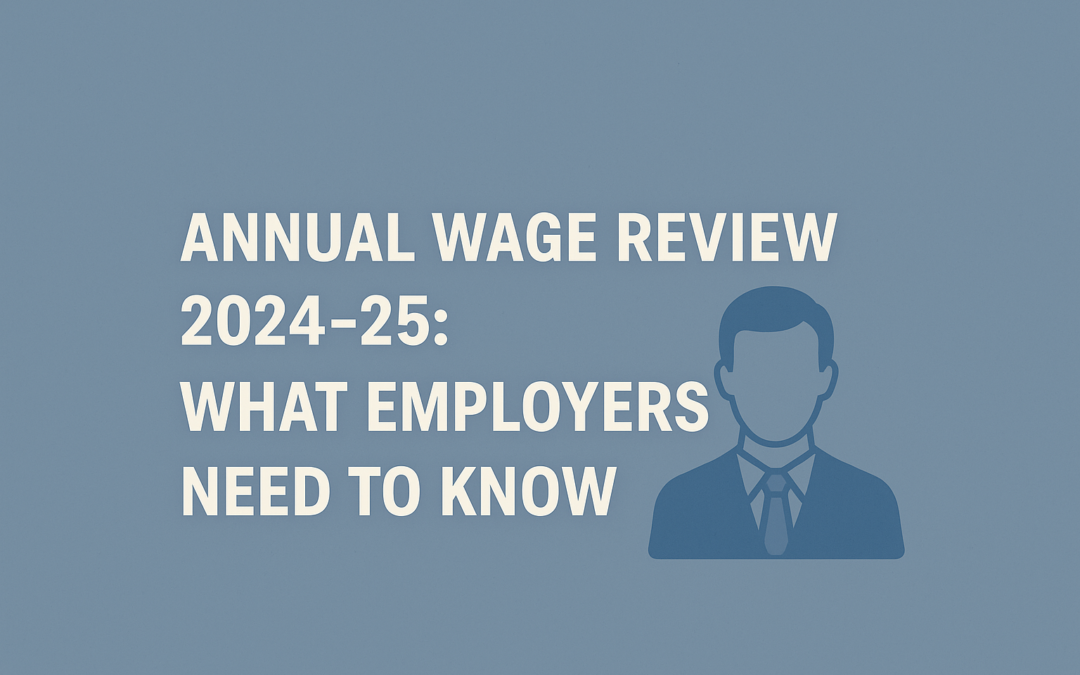On 3 June 2025, the Fair Work Commission handed down its Annual Wage Review decision for 2024–25. As a result of this decision, minimum wages across Australia will increase from 1 July 2025. These changes include a 3.5% increase to both the National Minimum Wage and minimum award wages, and they will apply to a substantial portion of the Australian workforce.
The decision will directly affect around 3 million employees, which represents approximately 20% of Australia’s total workforce. The most affected industries include hospitality, healthcare, aged care, social assistance, retail, and administrative services, where employees are more likely to be covered by a modern award and therefore directly impacted by changes to award wage rates.
Key Changes from 1 July 2025
Following the Annual Wage Review decision, from the first full pay period on or after 1 July 2025:
- The National Minimum Wage will increase by 3.5%, rising to $24.95 per hour, or $948.00 per week for a full-time employee working a standard 38-hour week.
- Minimum award wages will also increase by 3.5%. This includes all classifications under modern awards across various industries.
- The superannuation guarantee rate will increase from 11.5% to 12%, in accordance with the legislated schedule of increases.
These changes are binding and must be applied by all employers covered by the national workplace relations system. This includes sole traders, partnerships, companies, and not-for-profits who employ staff under modern awards or pay the National Minimum Wage.
What About Enterprise Agreements?
If your business operates under an enterprise agreement, it is essential to check that the base rates of pay under the agreement continue to meet or exceed the applicable minimum award rates after the increase. If they fall below, employers are legally required to top up employees’ pay to meet the new minimum. Non-compliance can result in underpayment claims, penalties, and reputational damage, particularly in a regulatory environment that is increasingly focused on wage integrity.
Legal and Financial Risks of Non-compliance
Failing to pass on the new minimum wage or superannuation guarantee increases may be a breach of the Fair Work Act 2009 (Cth). Employees or unions may bring legal claims, and the Fair Work Ombudsman may initiate investigations or enforcement proceedings. It is important to understand that intent is not required for liability. Failure to comply, even inadvertently, can lead to penalties.
Managing Cost Pressures
If your organisation is concerned about the financial impact of these changes, you may need to explore adjustments to manage increased wage costs. This could include:
- Reviewing staffing levels and workload distribution
- Considering changes to employee hours or duties
- Exploring options for organisational restructure or redundancy
However, these are not steps that should be taken lightly. Each of these options carries its own legal risks, including risks of unfair dismissal claims or breach of consultation obligations under modern awards or enterprise agreements. Employers should ensure that any structural changes are carried out in accordance with workplace laws and after seeking appropriate advice.
Recommended Next Steps for Employers
- Update payroll systems to apply the new wage and superannuation rates from the correct date.
- Conduct an audit of all current employee pay rates, including those under enterprise agreements, to ensure compliance.
- Review and update employment contracts, pay slips, and pay notices where necessary.
- Inform employees of any pay adjustments and explain the reasons for the changes.
- Seek legal advice before making any changes to staffing arrangements or employment conditions due to financial constraints.
Being proactive now can help you avoid compliance issues later. If you require assistance interpreting the new wage rates, applying them correctly across your workforce, or managing the financial impact of these changes, our team is here to help.
Contact us on (02) 9181 5001 or email [email protected] for tailored advice and support with award interpretation, payroll compliance, or workforce management strategies.

